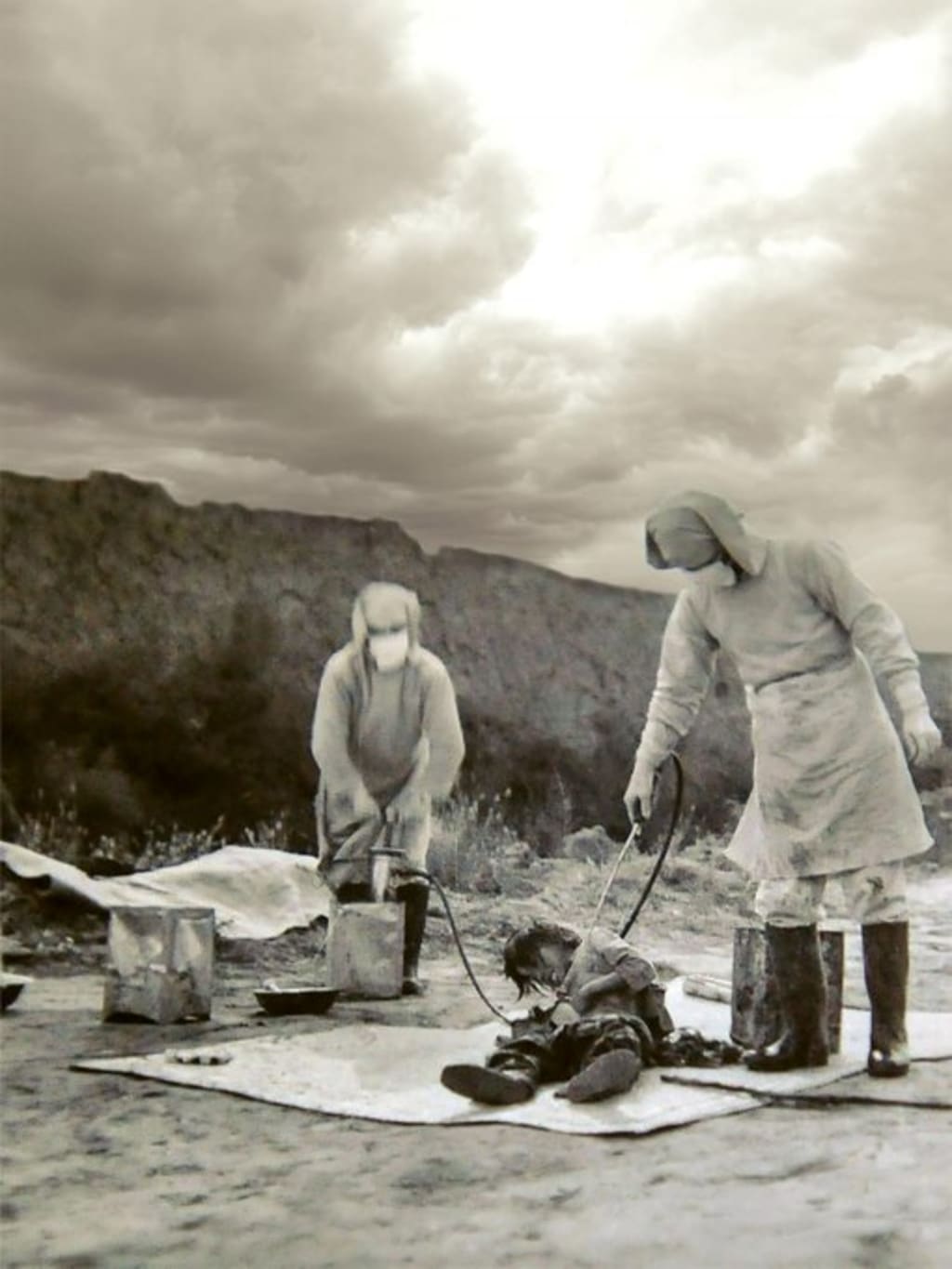Content warning
This story may contain sensitive material or discuss topics that some readers may find distressing. Reader discretion is advised. The views and opinions expressed in this story are those of the author and do not necessarily reflect the official policy or position of Vocal.
Unit 731
The Horrors of Japan's WWII Biological and Chemical Warfare Program

During World War II, the Imperial Japanese Army conducted extensive and brutal chemical and biological warfare research on human test subjects, leading to the deaths of an estimated 200,000 people. This horrific chapter in history, known as Unit 731, saw victims intentionally exposed to deadly pathogens such as anthrax, bubonic plague, cholera, syphilis, typhus, and more. The experiments conducted by Unit 731 were some of the most inhumane and barbaric acts ever perpetrated in the name of science and warfare.
Unit 731 was established in 1936 in the Pingfang district of Harbin, in Japanese-occupied China. Officially known as the Epidemic Prevention and Water Purification Department of the Kwantung Army, its true purpose was far more sinister. Under the leadership of General Shirō Ishii, Unit 731 engaged in a wide range of experimental atrocities aimed at developing and perfecting biological and chemical weapons.
The scope of the experiments conducted at Unit 731 was staggering and included some of the most grotesque and cruel forms of human experimentation imaginable. Victims were intentionally infected with virulent diseases to study their effects and to refine methods of spreading these pathogens. Anthrax, bubonic plague, cholera, syphilis, and typhus were among the diseases used in these experiments, leading to excruciating suffering and death for the infected individuals.
Beyond pathogen exposure, Unit 731 conducted a variety of other brutal experiments. Vivisection, or the dissection of living individuals without anesthesia, was a common practice used to study the progression of diseases and the effects of various injuries on the human body. Controlled dehydration experiments forced victims to endure extreme thirst, while biological weapons testing involved exposing subjects to contaminated bombs and other delivery mechanisms.
The atrocities did not stop there. Hypobaric pressure chamber testing subjected victims to rapidly changing atmospheric pressures, often resulting in severe trauma or death. Organ harvesting and amputations were performed without any regard for the victims' survival, solely to understand the impacts on human physiology. Standard weapons testing saw prisoners used as live targets to measure the effectiveness of new weapons.
The victims of Unit 731 were not limited to any specific group. Men, women, children, and even infants born to women who were raped by the staff were subjected to these horrendous experiments. The complete disregard for human life and dignity in Unit 731's operations is a stark reminder of the depths of cruelty that can be reached under the guise of scientific advancement and military necessity.
Unit 731's activities were shrouded in secrecy during the war, but the truth began to emerge in the post-war years. Despite the overwhelming evidence of war crimes, many of those involved in Unit 731, including General Shirō Ishii, were granted immunity from prosecution in exchange for their research data. This immunity deal was struck by the United States government, which sought to gain an advantage in biological and chemical warfare knowledge during the early years of the Cold War.
The decision to grant immunity to Ishii and his colleagues has been a source of ongoing controversy and condemnation. It allowed those responsible for some of the most heinous war crimes to escape justice and further compounded the suffering of the victims and their families. Moreover, it highlighted the ethical compromises made by nations in the pursuit of scientific and military superiority.
The legacy of Unit 731 remains a painful and dark chapter in history. Survivors and families of victims have sought recognition and justice for the atrocities committed, and there have been numerous calls for formal apologies and reparations from the Japanese government. Despite some acknowledgment of the horrors of Unit 731, many details remain obscured, and the full extent of the crimes committed is still being uncovered.
In recent years, efforts have been made to educate the public about the atrocities of Unit 731. Documentaries, books, and academic research have shed light on the experiments and the suffering endured by the victims. Memorials and museums in China, such as the Unit 731 Museum in Harbin, serve as somber reminders of the past and as warnings of the dangers of unchecked military power and scientific experimentation without ethical boundaries.
The story of Unit 731 also serves as a crucial lesson in the importance of ethical standards in scientific research and the need for accountability in times of war. The victims of Unit 731 were dehumanized and treated as mere tools for experimentation, highlighting the extreme consequences of losing sight of human rights and dignity in the pursuit of knowledge and power.
In reflecting on the atrocities committed by Unit 731, it is essential to remember the individual lives affected by these brutal acts. The men, women, and children who suffered and died in these experiments were not mere statistics but human beings with families, dreams, and aspirations. Their stories deserve to be told and remembered as a testament to their suffering and resilience.
As we look back on the horrors of Unit 731, we must also consider the broader implications for contemporary society. The ethical challenges posed by scientific and technological advancements continue to evolve, and the lessons from Unit 731 remain relevant. Ensuring that scientific research is conducted with strict adherence to ethical standards and human rights is crucial in preventing similar atrocities in the future.
Moreover, the story of Unit 731 underscores the importance of transparency, accountability, and justice in addressing war crimes and human rights violations. The decision to grant immunity to those involved in Unit 731's experiments serves as a stark reminder of the moral compromises that can occur in the pursuit of strategic advantages. It is a cautionary tale of the need for a steadfast commitment to justice and the rule of law, even in the face of competing national interests.
In conclusion, the atrocities committed by Unit 731 during World War II represent one of the darkest chapters in the history of human experimentation and warfare. The estimated 200,000 victims who suffered and died as a result of these cruel experiments remind us of the profound consequences of unchecked power and the dehumanization of individuals. The legacy of Unit 731 continues to resonate today, serving as a powerful reminder of the need for ethical vigilance in scientific research and the pursuit of justice for those who have suffered from such egregious violations of human rights.
About the Creator
Enjoyed the story? Support the Creator.
Subscribe for free to receive all their stories in your feed. You could also pledge your support or give them a one-off tip, letting them know you appreciate their work.






Comments
There are no comments for this story
Be the first to respond and start the conversation.